Adrenal fatigue – Symptoms
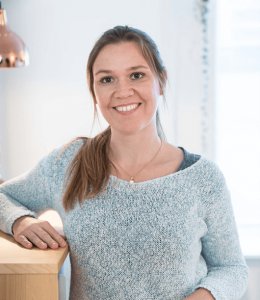
The psychologist who thought she had ADHD – A personal story about adrenal fatigue.
I am usually a private person and I have had many considerations about whether or not to share my story, since it is very personal, but the topic is simply too important not to.
I hope my story can inspire others and provide a shortcut to get the right help.
I want to give a big thank you to all of you who support Det Sunde Sind. It means more than you know! 🙂
(You are welcome to share the article.)
For as long as I can remember, I have felt tired. Even when I had just slept. I was tired when I got up in the morning, tired after taking a nap in the afternoon, tired if I slept in, and tired even if I went to bed early. The only times I didn’t feel exhausted was between 10 at night and 4 in the morning, and because of this I thought I was a night owl by nature. I had also read an article stating that intelligent people are often night owls who like to stay up late. This notion fit quite well with me 🙂
I organized my everyday life around my fatigue. In school I used to be late no matter how hard I tried to be on time. I dropped out of high school halfway through because I had too much absence and couldn’t keep up. As a teenager my mother said my fatigue was due to hormonal imbalances and later it turned out she was right.
I moved away from home when I was 17 and started HF (an alternative type of high school in Denmark). My grades improved significantly and I finished with the highest grade point average in my class. This was possible for me to achieve because there were no assessments throughout the year. Instead there were only final exams at the end of the year and I was good at cramming in information for the exams. In a way I was proud of my ability to sit up at night and have “study marathons”.
In 2003 I travelled to Australia when I was 21 years old as a backpacker, and at 22 years of age I moved to Brisbane to study psychology and be with my boyfriend at the time. I was still tired, short tempered, distracted and foggy brained, but I didn’t give it much thought because I I didn’t know any different and didn’t have a solution. Besides that, I was busy coping with being a foreigner in a new country, learning the language, achieve good grades, fitting in socially and appearing put together.
This pattern of pushing through my exhaustion, mood swings and brain fog continued after my boyfriend and I split up and I returned to Denmark in 2008 in order to finish my master’s degree in psychology. During the first year I focused on trying to get the study commission to recognize my Australian bachelor’s degree, getting a job, and reestablishing a social network. By that time I had been away from Denmark for almost 6 years. The master’s degree suited me well because I was free to organize my time and choose when to study. I could skip lectures if I felt too tired, and instead study at home and sleep when I needed to. I got a 10 (2nd highest mark) for my thesis, which actually pulled down my overall average mark. I was good at performing.
During my master’s degree I worked as an investigator in the probation service. It was a job that suited me perfectly because the reports were written from home. This allowed me a great deal of freedom and flexible working hours, and I wrote many of the reports on my computer while lying in bed.
I graduated as a psychologist in May 2011 and my first job was in an internship where I did supervised practice. I was sometimes so tired that I had to pinch my thigh during consultations, or go to the bathroom and do jumping jacks between consultations to stay awake. Of course I wondered why I was so tired because I had plenty of sleep, but I was too busy just trying to get through the day, perform as a recently graduated psychologist, and appear well functioning at the surface. During my first year of supervised practice I had 136 clients, and I remember that only one of those 136 clients did not want to book in with me again after first consultation. This is a very good statistic for an inexperienced psychologist, and in my opinion it says something about how much effort I put into doing a good job and make sure people didn’t notice how I felt.
At the time, I didn’t feel depressed. I was happy with my life and wanted to do many things, but was just extremely tired, foggy-brained, inattentive, irritable, and often felt I had to drag myself through the day.
It wasn’t until I got a job as a school psychologist in 2012, that I no longer could uphold my façade. The working day often consisted of 2-hour meetings, where it wasn’t possible to go to the bathroom to do jumping jacks, and there was a lot to keep track of. There was also networking meetings, family interviews, phone calls, tests to run and information going back and forth. I couldn’t keep up and I had to quit. I knew something was wrong, and I had to get help if I was going to finish my certification as a psychologist. It is important to mention here, that it wasn’t because my symptoms had gotten worse – it was just the first time that I wasn’t able to organize my life around my difficulties since the rest of my certification had to be completed in the public sector. This required different competencies on my behalf.
I googled possible causes for my symptoms and asked my doctor to be assessed for narcolepsy (neurological disorder that involves excessive daytime sleepiness). Before my doctors appointment I spoke with a family member who had been diagnosed with ADHD. She asked if I had considered if that could be the condition I was suffering from as well. I hadn’t, but when I read that both narcolepsy and ADHD are treated with Ritalin I thought, “oh well, why not”. I was able to recognize many ADHD symptoms since childhood, eg inattentiveness, not thinking actions through, and forgetfulness. My doctor referred me to a psychiatrist without discussing other options, and I eagerly grabbed the chance to find a solution to my problem.
The assessment at the psychiatrist’s office consisted of a single interview. After having told him a little bit about my life and my symptoms he said, that if I had ADHD, it was only very mild. I urged him to let me try medication at least during working hours, so it would be possible for me to hold a job in the public sector and finish my certification. He ensured me that Ritalin only works on people with ADHD, and therefore it was fine to give it a try, cause if it worked it was because I had ADHD, and if it didn’t work, there was no harm done.
I remember the first time I had to take the medication. I had organized to do it at a friend’s place because I felt so nervous. I had smoked hash a couple of times when I was 17, but had never tried any other kinds of drugs. It worked! It felt like my mind cleared, I became focused and AWAKE. At that time I thought it had to be because I had ADHD, but most of all I was glad to know that now I would be able to finish my certification and function in society.
In spring 2013 I got a job as a psychologist in an unemployment office, where I was able to finish my certification. The medication was a huge help; when I took it, I functioned. I woke drowsily in the morning, took a pill, after 20-30 minutes I was awake. I had never in my adult experienced feeling truly awake, and I felt grateful.
In spring 2014 I became self employed full-time and my practice grew slowly. I started to have more energy to reflect on myself and my life. There were no longer exams to pass or deadlines to meet. In the summer 2015 I went on a 14 day yoga holiday in India with a friend and with lifestyle changes and support from an ayurvedic doctor, I only needed 1/3 dosis ritalin by the end of the retreat compared to when I arrived. However, it was difficult for me to figure out exactly what lifestyle changes it was that made the difference, and it wasn’t possible for me to continue doing yoga three times a day when I came home. As a result my life gradually returned to the old pattern.
In the summer 2017 I again started to research possible alternative causes for my symptoms and came across some articles about thyroid- and adrenal fatigue. There were a lot of similarities between the symptoms of adrenal fatigue and ADHD, this table shows some of them:
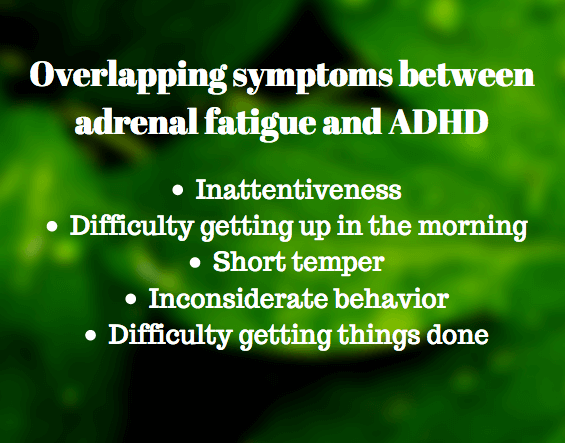
Besides the symptoms mentioned above there was a long list of other symptoms I also recognized with adrenal fatigue. Here are some of them:
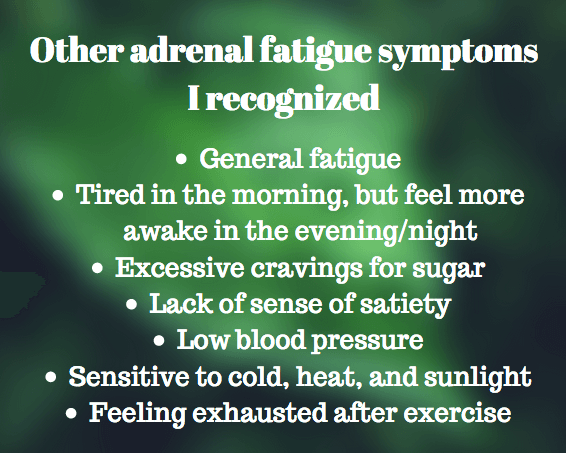
It also made sense to me when I read, that adrenal fatigue usually is a result of a period with long-term stress. I remembered my symptoms back to when I was 13 years old, which was the time, when my parents got divorced. I grew up in a home where everything was clean and tidy. There was no physical violence, but my parents had violent quarrels with rage and tears that sometimes could go on for days. It culminated in a chaotic and turbulent divorce when I was 13 years old, followed by a year at boarding school when I was 14 to 15 years old. It made sense to me that these years had stressed my system to the max.
In the fall 2017 I was coincidentally invited to work as a psychologist in an interdisciplinary research project about integrative medicine (holistic medicine) together with two Canadian naturopathic doctors, a music therapist and a yoga teacher. It was one of those coincidences, which feel like send from above, because while I contributed with my professional competencies, I was also able to learn from the other practitioners. The Canadian naturopathic doctors were both trained in conventional medicine and integrative medicine, which is recognized on a par with conventional medicine in many provinces in Canada. This meeting inspired me to take a saliva test for adrenal fatigue, which was a big turning point for me. For the first time I had tangible proof showing the cause of my fatigue. The test measured the level of the hormone cortisol as well as a hormone called DHEA throughout the day, and the results showed that my adrenal function was reduced.
In consultation with Vivian Lord, who was one of the integrative doctors in the team, a plan was made on how I could heal myself through various lifestyle changes, herbal medicine and nutrient therapy. In the course of a few months I was able to quit medication and manage with a cup of coffee a day and a nap every now and then.
As I write this article it is almost 4 months since I quit taking ritalin. I rarely need to take a nap during the day, and on some days I don’t feel the need for coffee at all. I usually wake in the morning and feel awake and rested. I can’t remember experiencing that since I was a child. It is truly an amazing feeling, and I am so happy I have been able to heal myself.
Of course there is also a sense of bitterness since I am 36 now and have felt constantly tired from undiscovered adrenal fatigue for at least 23 years. Of course I think about how my life would have been if I hadn’t had to live with feeling tired for so many years where most of my energy was spent on managing the most basic things and sustaining a façade. I also think about how many other than me have been misdiagnosed and received the wrong treatment. Throughout my participation in the research project I realised how much lifestyle and nutrition affects the body and mind.
I am not an expert in integrative medicine, but I want to share my personal experience with you. In my next blog I will go more into more detail about what has worked for me: What lifestyle and nutritional changes I have made, what is good to do and what I good to avoid doing.
It is important for me to emphasise that in no way do I claim that what has worked for me will work the same way for everyone who has the diagnosis ADHD, but if you are curious and some of the things I have written resonate with you, then I can warmly recommend consulting a practitioner who understands the connections between nutrition, hormones, body and mind. A good place to start is Vivian Lord’s homepage, since she is highly knowledgable and competent, and she has some free material available on the subject.
You are welcome to share this article if you think others might benefit from it.
(The Danish version of the article is available here.)
With Love from
Iben Larissa Jørgensen
Certified Psychologist in Copenhagen
Det Sunde Sind




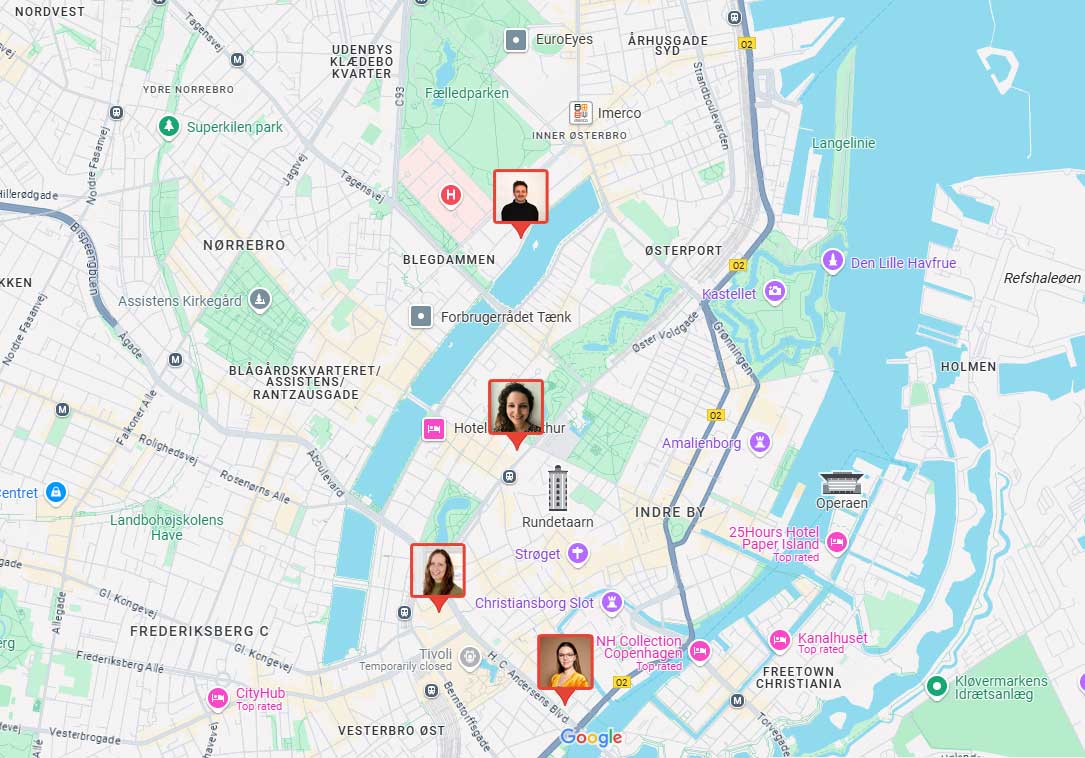
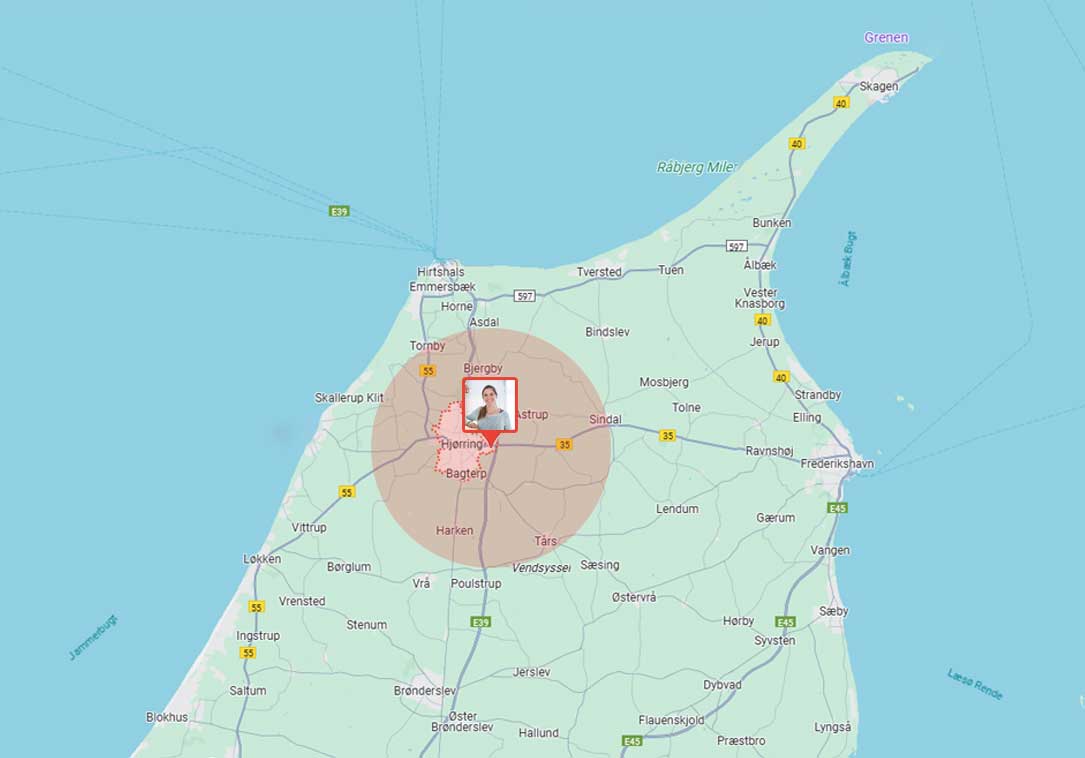


I would love to know what supplements and nutritional changes you made
Hello Tamara,
It is all in my second article. You can find it here: https://detsundesind.dk/adrenal-fatigue-8-steps-to-heal/ 🙂
Kind regards from Iben.
Hi Iben,
Your story resonates deeply with me on many levels, including the current struggles I am facing with what I suspect to be adrenal insufficiency. I recently relocated to Copenhagen for another Bachelor’s Degree and I am seeking a doctor here who would be able to help me through a similar issue. Do you have anyone you could recommend? I would greatly appreciate any help or advice.
Best,
Meagan Klein
Hi Meagan,
Thank you so much for your comment. I am sorry to hear that you are struggling with your health, but fortunately as you can read from my articles there is much hope 🙂
I am not aware of any other doctor in Denmark who works with these issues the same way Vivian Lord does. However, Vivian does all of her work over the phone or online, so distance is not an issue.
There is generally not much awareness on adrenal fatigue in Denmark, so it is not easy to locate a doctor with this expertice.
I hope you find the right help.
Kind regards from Iben.